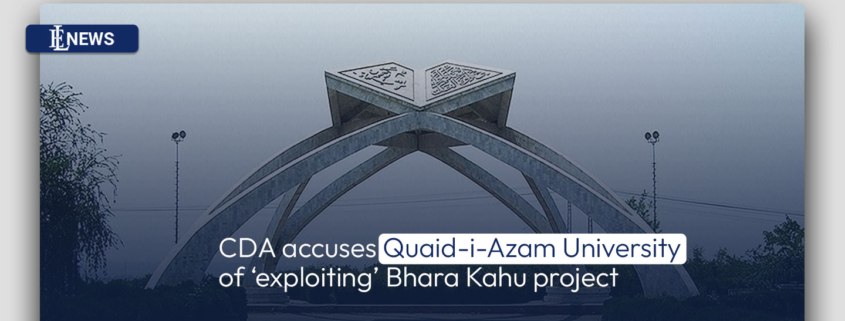CDA accuses Quaid-i-Azam University of ‘exploiting’ Bhara Kahu project
ISLAMABAD—On Tuesday, a lawyer for the Capital Development Authority (CDA) said that the Quaid-i-Azam University (QAU), which has gone to court to stop the Bhara Kahu bypass from being built on university land, is trying to get a “undue advantage” in exchange for letting the project go forward.
Read more with EL news: CDA decided to remove intrusions from trade centers
CDA’s lawyer, Hafiz Arafat Ahmed, was arguing before Justice Miangul Hassan Aurangzeb of the Islamabad High Court (IHC) about a petition from the university’s faculty against a project that would split the QAU campus in two.
The lawyer said that the project started after getting all the necessary approvals and that the Environmental Impact Assessment (EIA) was done while the case was still before the IHC.
He said that the project was first thought up by the National Highway Authority (NHA), and the Pakistan-Environmental Protection Agency (EPA) also did an EIA on it (Pak-EPA). But the federal government couldn’t find the money, so the bypass project was put on hold.
He said that the CDA tried again about a year ago, but the Pak-EPA didn’t give the project the green light. He said that the EIA was recently approved by the Pak-EPA.
The petitioner said that the CDA was hurting the environment and cutting down trees. The lawyer for the CDA told the court that he has “footage of the site before the project started and the most recent one.” Advocate Arafat said that the professors were trying to take advantage of the situation to get benefits that the university didn’t deserve.
QAU demands ‘illogical’
He told everyone what the university had asked for during the first meetings about the bypass project.
The university asked that the land set aside for the Bhara Kahu bypass not be given to the CDA. Instead, it should stay in the hands of QAU, along with the right of way. But the lawyer said that since the CDA bought the land for the bypass and was in charge of keeping it up, the university would not get the title to this land.
He said that the university’s second request was for a letter of allotment for the promised 225 Kanals of land to be sent out within 24 hours. The lawyer said that this will be done the way the law says it should be.
He said that the authority agreed to build an underpass at Shahdra Road and a 24-foot-wide service road on each side of the bypass. He also said that the request to build a smaller underpass was not “feasible.”
He told the court that the government agency was ready to build a new road from Murree Road to QAU, which will give the university its own main entrance.
The lawyer also said that a request that the “CDA Board will consider a dedicated “Green Line Route” from Bhara Kahu to QAU to Bari Imam and to the Secretariat Metro Station” and a shuttle service from Bhara Kahu’s main terminal to QAU with a 50% discount for students has nothing to do with what the university is supposed to do.
In response to the demand that encroachments be removed, the CDA lawyer said that the local government will try to get rid of all encroachments on QAU’s land, as long as QAU shares detailed information and maps and after the land has been clearly marked.
The lawyer for the CDA also said that the request to renew the lease for 33 years without any fees was not fair.
He also said it made no sense to ask the federal cabinet to “waive the outstanding amount against the land lease, annual ground rent, and property tax” and to ask for a Rs500 million bailout package.
Also, the counsel said, “one student hostel will be built through the Higher Education Commission Pakistan’s Umbrella Project,” because that was not the CDA’s job. He said that building an academic block, allowing a portion of its land to be used for mixed purposes (such as a community centre, gas station, residential complex, or “education city”), and paying for these projects with private money have nothing to do with education. He said that trying to get these extra benefits is the same as taking advantage of the situation.
The lawyer also said that the CDA had to do something about noise pollution and plant trees, which was another problem that the QAU had with the project.
During the hearing, the petitioner’s lawyer said that the bypass project put at risk Rs10 billion in funding for a project that would build the China-Pakistan Joint Research Center on Earth Sciences. Justice Aurangzeb said that neither the petitioners nor the university were thinking about how the project would hurt the environment.
Aziz Nishtar, the lawyer for the petitioner, told the court that he had asked Pak-EPA to look into the project in a letter. Justice Aurangzeb pointed out that the letter in question had not been brought to court, and he told the lawyer to ask for help from the same forum. He said, “This is a court of record, so we can’t look at any letter that’s floating around.”
The court put off hearing this case again until December 9.



